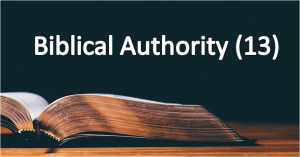=============================================
SEEKING THINGS ABOVE
“If then you were raised with Christ, seek those things which are above,
where Christ is, sitting at the right hand of God. “(Col. 3:1)
Volume II Number 6
September 2021
=============================================
The Land of the Living
(Psalm 27:13)
Mike Johnson

In Psalm 27:13, the Psalmist (thought to be David) said, “I would have lost heart, unless I had believed that I would see the goodness of the Lord in the land of the living.” What is meant by the land of the living? Today, if someone has not seen someone for a long time, he might say, “I am glad you are still in the land of the living,” i.e., still alive. Old Testament writers use this expression many times, and it always seems to be used in the sense of life here on this earth, i.e., not in the grave. (Some contend that David is looking toward the afterlife and calling it the land of the living. However, this does not seem to be the case.) The verse says that David fully expected to see the goodness of the Lord at some point in his life. This confidence kept him going.
There is another way to look at the phrase “the land of the living.” When John Newton (an Anglican Cleric and writer of the hymn Amazing Grace) in 1807 was on his death bed, someone asked him how he was doing and if he was still in the land of the living. He responded with what ended up being his last words saying, “I am still in the land of the dying; I shall be in the land of the living soon.” So, in one sense, we are in the land of the living during our life on this earth. However, in another way, we are in the land of the dying. Consider the following quote.
The land of the living. Alas! What a land of the living is this, in which there are more dead than living, more underground than above it; where the earth is fuller of graves than houses; where life lies trembling under the hand of death; and where death hath power to tyrannize over life! No, my soul, there only is the land of the living where there are none but the living . . . — Sir Richard Baker. (from The Treasury of David)
Yet, while we are alive, in one sense, we are in the “land of the living. Therefore, as with David, we must allow our faith to sustain us and have complete confidence in God. If we do so, we can go to a place where there will be no death (Rev. 20:14), i.e., Heaven, which can indeed be called the land of the living!
__________
Can We Have Too Much “Positive” Preaching
Greg Gwin
 We readily acknowledge the importance of positive preaching. Brethren need the “comfort of the Scriptures” (Romans 15:4). Paul sent Tychicus to the Ephesians so that he could “comfort your hearts.” Timothy was dispatched to Philippi (Philippians 2:9) and Thessalonica (I Thessalonians 3:2) in order to comfort the brethren. Clearly, this kind of positive encouragement is essential. The Bible has much to say about it. No one denies this.
We readily acknowledge the importance of positive preaching. Brethren need the “comfort of the Scriptures” (Romans 15:4). Paul sent Tychicus to the Ephesians so that he could “comfort your hearts.” Timothy was dispatched to Philippi (Philippians 2:9) and Thessalonica (I Thessalonians 3:2) in order to comfort the brethren. Clearly, this kind of positive encouragement is essential. The Bible has much to say about it. No one denies this.
There are, however, some among us who are determined to only preach positive things. They want to specialize in positive preaching and to emphasize only those things which (they claim) are designed to “build up” the hearers. They will not deal with controversial topics, and they refuse to spend time rebuking the sins and weaknesses that exist in men’s lives.
This “positive” approach fails to present the whole counsel of God (Acts 20:27), and at least two serious consequences will follow:
- Christians will not be admonished to root out the evil that is in their lives. We must “put off the old man” (Colossians 3:9). We will never become the “new man” that we ought to be (Colossians 3:10) until we have been instructed adequately in this regard.
- Christians will become conditioned to only want this sort of teaching and preaching. After having a steady diet of positive emphasis, brethren will lose all tolerance for forceful preaching on important doctrinal and moral issues. The apostle Paul anticipated such a scenario: “For the time will come when they will not endure sound doctrine; but after their own lusts shall they heap to themselves teachers, having itching ears” (II Timothy 4:3).
We are not at liberty to be “specialists” in only one aspect of the work. If we emphasize the positive while neglecting the negative, we have not done “the work of an evangelist” (II Timothy 4:5). Our job involves both the positive and the negative. We are to “reprove, rebuke, and exhort” (II Timothy 4:2).
Related Article
__________
The Silence of the Scriptures
Mike Johnson

What should be our attitude regarding the silence of the Scriptures? What should we do regarding situations in which the Lord says nothing? These questions are critical. Disagreement on how to regard the silence of the Scriptures has caused much division over the years. If we could agree on how to view the silence of God’s Word, we could do much in achieving unity among religious people.
There are two approaches often taken regarding the silence of the Scriptures. One view is that when the New Testament is silent, we are at liberty to act as we please and can do whatever we want in the service of God.” This viewpoint is the “permissive” approach. According to this view, we can do anything not expressly forbidden, and everything is acceptable unless God has said, “Thou shall not.” The other approach might be called the prohibitive view. Those who take this view would say we must only do what the New Testament authorizes. The law of exclusion prevails with this view, as the unmentioned is not permitted.
Where do we find the answer to how we should view the silence of the Scriptures? It is essential to determine our approach from the Scriptures—the Word of God. We cannot answer this question based on our own opinions nor learn the position to take from the writings and views of others. God has given us the Scriptures, which show us what our method of interpretation should be.
To begin with, consider how Noah had to regard the silence of the Scriptures. In Genesis 6:14-15, God told Noah to build an ark out of gopher wood. Further, the ark was to be three hundred cubits long, fifty cubits wide, and thirty cubits high. Could Noah have used oak to build the ark? God did not say he could not, but obviously, this would have been wrong. Gopher wood was what God specified for the ark, which eliminated all other types of wood. God did not have to say do not use oak, pine, or maple. When God specified what he wanted, this ruled out every other kind of wood. Could Noah have changed the dimensions of the ark? After all, God did not say do not make the ark three hundred and fifty cubits long. God did not have to say this. When He said to make the ark three hundred cubits long, this eliminated every other possible length. Noah had to respect the silence of God.
Another Old Testament example is the case of Nadab and Abihu. We learn from Leviticus 10 that these two priests offered “profane fire before the Lord, which He had not commanded them.” As a result of their sin, verse 2 says, “So fire went out from the Lord and devoured them, and they died before the Lord.” It appears they got the fire, which they offered, from the wrong source rather than the altar of burnt offering (16:12). Because God had not commanded the fire they used, it was sinful for them to use it. Nadab and Abihu would have been wrong to argue that their sacrifice was acceptable because God had not prohibited them from using this other source. When God specified the fire He wanted, this eliminated all other sources. These priests should have respected the silence of God.
Consider also the case of Naaman in 2 Kings 5. Naaman was a “commander of the army” of the king of Syria and was an honorable man. His king highly regarded him, but he had leprosy. He received information about a prophet in Samaria who could heal him, so he went and found this prophet—a man named Elisha. To be cured of his leprosy, Elisha told him to dip seven times in the Jordan River. At first, he refused to do what the prophet said, reasoning that the rivers of Damascus were better than all the waters of Israel. Finally, his servants persuaded him to do what Elisha told him to do. It is clear that Naaman had to dip seven times in the Jordan if he wanted the cure —no other rivers were suitable. God, through Elisha, specified the river to wash in so, because of God’s silence, all other rivers were unacceptable. God did not have to say, “Wash in the Jordan River,” and then, to eliminate other rivers say, “You can’t wash in this river or that river to receive it.” Further, Naaman had to dip seven times in the Jordan River for the cure. Could Naaman have dipped five times and still receive the remedy? God did not say, “Don’t dip five times.” NO, when God specified that Naaman had to dip seven times, other amounts were eliminated.
In the New Testament, consider Hebrews 7. Here we find a discussion of the priesthood of Christ. Under the old law, a person had to be of the tribe of Levi to be a priest. Christ, who was of the tribe of Judah, was not a priest under the Levitical system. Although of the tribe of Judah, Christ is our priest today. The writer uses this change in the priesthood to show that the old law was no longer in effect. To illustrate the point of our discussion, consider verse 14, which says, “For it is evident that our Lord arose from Judah, of which tribe Moses spoke nothing concerning priesthood.” Why was Christ unable to be a priest under the Levitical system? A person had to be of the tribe of Levi; Christ was of the tribe of Judah, and concerning the tribe of Judah, Moses had said “nothing.” God’s silence eliminated Judah as an acceptable tribe for a priest to be from under the Levitical system. God did not have to say that Levi was the tribe one had to be a member of and then name all the other tribes saying they were unacceptable. When he specified Levi, this eliminated all other tribes. Many people today, if they had been there, would probably have erroneously said that if one was of the tribe of Judah, he could be a priest, because after all, Moses did not say you could not. This approach involves the type of reasoning often used today to justify certain religious practices.
Consider Acts 15, where there is a discussion of the question of circumcision. There was a controversy in the early church because some had gone out from Jerusalem, teaching that the Gentile converts had to be circumcised. After a discussion in Jerusalem, they sent a letter to the churches stating, “Since we have heard that some who went out from us have troubled you with words, unsettling your souls, saying, ‘you must be circumcised and keep the law’—to whom we gave no such commandment” (v. 24). These false teachers were wrong because of the silence of the inspired teaching. God gave “No such commandment,” so it was wrong to require circumcision. The false teachers would have been wrong if they had tried to justify their teaching by saying that God did not say it was not required. These people had added to God’s Word (Rev. 22:18-19).
In Hebrews 1, there is a discussion of the superiority of Christ over angels. Verse 5 says, “For to which of the angels did He ever say: ‘You are My Son, Today I have begotten You?’ And again: ‘I will be to Him a Father, and He shall be to Me a Son?’” No angel had the right to claim to be the Son of God. This fact indicates the superiority of Christ as the statement of verse five was direct to Him, not to an angel. God’s silence (in not making this statement to angels) meant they do not have this honor.
Consider a few examples from everyday life to illustrate this point further. In cooking, if a recipe calls for four eggs, it does not need to state, “don’t use five eggs.” The fact that it says four eliminates all other numbers. When we give our phone number to people, we do not have to say all of the numbers that it is not. We do not have to say, “don’t invert the order.” When we name a child, we do not have to say what the child’s name is not— only what it is. Zechariah, in naming his son, only had to write that his name is John. (Lk. 1:13, 60, 63) He did not have to say his name is not George. After announcing the hymn number to the congregation in worship services, the song leader does not have to say what the number is not. If he says we will sing hymn number 33, this eliminates all other hymn numbers. All of the above examples are obvious.
We can make a spiritual application to the Lord’s Supper, instituted by Jesus (Mt. 26:26-28). We learn that the elements of the Lord’s Supper are to be unleavened bread and the fruit of the vine. Jesus did not say do not use ham and eggs as the elements for the Lord’s Supper. Would it be wrong to substitute ham and eggs as elements? It would be wrong because Jesus specified what he wanted, thus ruling out all else.
Since the Bible also teaches that baptism is a burial in water (Rom. 6:1-4, Col. 2:12, Acts 8:36), it does not need to specifically say, “Don’t use sprinkling for baptism.” Therefore, any other form that people might come up with when the Bible specifies a burial is wrong. Therefore, using sprinkling for baptism instead of a burial in water (as the Bible specifies) is incorrect because of the silence of the Scriptures.
Many religious groups use instrumental music in their worship. The Bible, however, specifies we are to sing (Col. 3:16, Eph. 5:19, 1 Cor. 14:15). When God specified singing, this rules out all other forms of music. Sometimes people will say, trying to defend the addition of instrumental music to their worship, that God did not say, “don’t use it.” He did not have to; God said what He wanted. Remember, Christ did not say, “don’t use ham and eggs for the elements of the Lord’s Supper.” Yet, most understand that He did not need to, having already specified the elements. In the same way, the specification of “sing” as the type of music to use today in worshiping God eliminates “playing.”
We can apply this same principle to many other Bible subjects. For example, God has specified the work of the church (teach the lost, teach Christians, help needy saints); the way the church takes in money (Christians giving on the first day of the week); the organization of the church (local autonomous congregations overseen by elders). Further, God has specified the subjects for baptism (penitent believers) and the day to partake of the Lord’s Supper (the first day of the week).
The Bible does not have to say that the church is not to provide recreation and entertainment. It does not have to say the church cannot function as a business to make money. The Scriptures do not need to specify that it is wrong to have someone called a bishop overseeing several congregations. It does not have to point out specifically that baptizing infants is contrary to God’s will or it is wrong to partake of the Lord’s Supper on Saturday. In all of these areas, God has specified what He wants; He rules out all else.
Consider a final illustration. Let us say that you send your son to the store, give him twenty dollars, and tell him to buy milk and eggs. The son returns, having spent the change on candy, ice cream, and soft drinks. Would the son be wrong? Yes, especially if you had told him, “When I send you to the store, you are allowed only to buy what I tell you.” The son could not successfully defend himself by saying, “you did not say not to buy soft drinks, candy, and ice cream” (or everything else the store has). No, when people specify what they want, this rules out all else. We do not have to say, do not buy this or do not buy that. If we can understand this principle, we can understand the importance of God’s silence regarding the subject of authority (Rev. 22:18-19). We must respect the silence of the Scriptures.
__________
I Wanted to Change the World
(Unknown)

When I was a young man, I wanted to change the world.
I found it was difficult to change the world, so I tried to change my nation.
When I found I couldn’t change the nation, I began to focus on my town. I couldn’t change the town, and as an older man, I tried to change my family.
Now, as an old man, I realize the only thing I can change is myself, and suddenly I realize that if long ago I had changed myself, I could have made an impact on my family.
My family and I could have made an impact on our town.
Their impact could have changed the nation, and I could indeed have changed the world.
Related Article
__________
|
|
|
Practice What You PreachJerral Kay |

A fountain pen salesman persuaded a merchant to order 500 dozen pens. He was writing the order in his notebook when suddenly the merchant exclaimed, “Hold on! I’m canceling that order!” Then he turned to wait on a customer. The salesman left the store perplexed and angry.
Later, the merchant’s bookkeeper asked, “Why did you cancel that fountain pen order?” “Why?” responded the merchant, “because he talked fountain pens to me for half an hour, using a number of forcible arguments, and then booked my order with a lead pencil. His practice did not agree with his profession.”
Does your Christian practice agree with your profession? Be on guard, as you’ll be tested when you least expect it!
via Rio Grande Valley Bulletin
Related Article
__________________________________
Short Audio Messages
Seeking the Face of God (5:47)
Mike Johnson
Sermon
Rick Lanning
====================================================
Editor: Mike Johnson
www.seekingthingsabove.org

